英语拓展提升训练
七年级英语 Unit5 Topic1-Topic2知识拓展训练 仁爱版
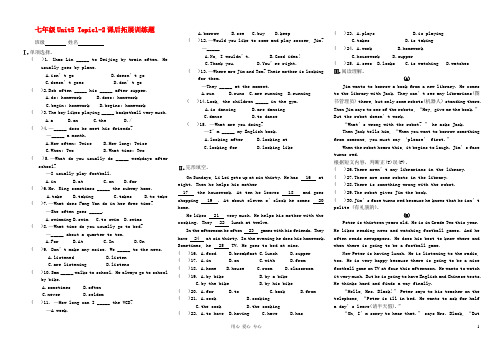
七年级Unit5 Topic1-2课后拓展训练题班级姓名Ⅰ.单项选择。
( )1. Zhao Lin _____ to Beijing by train often. He usually goes by plane.A.isn’t goB.doesn’t goC.doesn’t goesD.don’t go( )2.Bob often _____ his _____ after supper.A.do; homeworkB.does; homeworkC.begin; homeworkD.begins; homework( )3.The boy likes playing _____ basketball very much.A.aB.anC.theD./( )4.—_____ does he meet his friends?—_____ a month.A.How often; TwiceB.How long; TwiceC.When; TwoD.What time; Two( )5.—What do you usually do _____ weekdays after school?—I usually play football.A.inB.atC.onD.for( )6.Mr. King sometimes _____ the subway home.A.takeB.takingC.takesD.to take( )7.—What does Fang Yan do in her free time?—She often goes _____.A.swimmingB.swimC.to swimD.swims( )8.—What time do you usually go to bed?—_____ about a quarter to ten.A.ForB.AtC.InD.On( )9. Don’t make any noise. We _____ to the news.A.listenedB.listenC.are listeningD.listens( )10.Sam _____ walks to school. He always go to school by bike.A.sometimesB.oftenC.neverD.seldom( )11. —How long can I _____ the VCD?—A week.A.borrowB.seeC.buyD.keep( )12.—Would you like to come and play soccer, Jim?—_____A.No, I wouldn’t.B.Good idea!C.Thank you.D.You’re right.( )13.—Where are Jim and Tom? Their mother is lookingfor them.—They _____ at the moment.A.runB.runsC.are runningD.running( )14.Look, the children _____ in the gym.A.is dancingB.are dancingC.danceD.to dance( )15. —What are you doing?—I’m _____ my English book.A.looking afterB.looking atC.looking forD.looking likeⅡ.完形填空。
初中英语课文拓展性训练

初中英语课文的拓展性训练关键词:初中英语课文拓展性训练近几年,初中英语教材变化较大,阅读材料所占比例大幅提高;在所有考试中,阅读题的分值比例相当大,加上其它题型,如完形填空、书面表达等题,答题效果直接地或间接地与阅读理解有关。
如何有效开展阅读教学,提高学生的阅读能力成为初中英语教学亟待解决的问题。
阅读教学成功与否很大程度上取决于教学的策略性,阅读教学的策略性表现在采用模式的正确性,阅读过程处理的合理性,阅读评估的规律性和技巧使用的科学性。
如何在教学中正确的使用阅读教学策略,以达到预期的阅读教学目的,是阅读教学的关键所在。
因此,教会学生学会阅读方法,养成良好的阅读习惯,培养高效的阅读技巧,提高学生阅读水平,开展阅读策略的研究活动就显得十分必要。
本文正是致力于探索和尝试把初中英语课文进行拓展,把教材内容与拓展内容相结合,让学生不光接触到书本课文的知识,还能动手主动寻找课外相似的点,从而最大程度地发挥出初中英语课文的作用,有效提高学生的阅读能力、合作能力。
初中英语教材中的阅读题材多样。
以文章的题材来看,一般都以记叙文、说明文和应用文为主。
本文主要对上述三类题材的课文的拓展内容、拓展的方法以及相应的阅读方法的指导进行阐述。
一、首先是记叙文的拓展。
记叙文是以记叙、描写为主要表达方式的文体,它以写入叙事、写景状物为主要内容。
文章的中心思想通过写人、叙事表达。
初中阶段常见的记叙文主要包括文学记叙文和说明记叙文。
其中文学记叙文以虚构为主,如趣闻逸事、传说、寓言、传奇故事、短篇小说、科幻小说等;说明记叙文,以事实为依据,包括历史、传记、新闻报道、日记等。
(一)针对记叙文的这种特点,笔者制定了相应的拓展方法:(1)教师指导学生上网搜集素材,寻找内容相似,写作手法相似的文章,对相同类进行比较。
教师在指导学生搜集资料之前,先要充分地了解学情,对于学生的兴趣爱好、性格特点都要有所了解。
首先要把学生学习英语的热情调动起来,对于基础较差的学生,可以鼓励他们上网搜集一些简单易懂的趣闻轶事,既开阔了学生视野,又拓展了阅读的素材。
小学英语拓展课程教案

小学英语拓展课程教案教案标题:小学英语拓展课程教案教案目标:1. 帮助学生扩展英语词汇量和语言表达能力。
2. 提高学生的听说读写能力,培养他们对英语学习的兴趣。
3. 引导学生在课堂上积极参与,培养他们的团队合作和沟通能力。
教学重点:1. 学习新的词汇和表达方式。
2. 提高口语表达和听力理解能力。
3. 培养学生的写作能力。
教学准备:1. 教材:小学英语教材和辅助教材。
2. 多媒体设备:投影仪、音频设备等。
3. 练习材料:练习册、作业本等。
教学过程:一、导入(5分钟)1. 通过展示一幅关于主题的图片或播放一个相关的视频引起学生的兴趣。
2. 引导学生回顾之前学过的相关知识,例如问一些与主题相关的问题。
二、新知教学(20分钟)1. 向学生介绍新的词汇和表达方式,通过图片、单词卡片或多媒体展示的形式呈现。
2. 引导学生跟读和模仿老师的发音和语调,帮助他们正确掌握新的词汇和表达方式。
3. 制作一些与新词汇相关的练习,例如填空、连线等,巩固学生的记忆。
三、听说训练(15分钟)1. 播放一段与新词汇和表达方式相关的录音,要求学生仔细听并理解。
2. 组织学生进行口语练习,例如分组对话、角色扮演等,让学生运用新的词汇和表达方式进行对话。
四、阅读训练(15分钟)1. 分发一篇与新词汇和表达方式相关的短文,让学生默读并回答问题。
2. 引导学生进行小组讨论,分享他们的理解和回答。
五、写作训练(15分钟)1. 提供一些与新词汇和表达方式相关的写作题目,例如写一篇短文、写一封信等。
2. 引导学生按照要求进行写作,鼓励他们运用新的词汇和表达方式。
六、总结与作业布置(5分钟)1. 对本节课的内容进行总结,强调重点和难点。
2. 布置相关的作业,例如复习新的词汇和表达方式、完成写作任务等。
教学延伸:1. 鼓励学生在课外积极参与英语学习活动,例如听英语歌曲、看英语动画片等。
2. 提供一些在线学习资源和练习题目,供学生自主学习和巩固。
教学评估:1. 教师观察学生在课堂上的表现,包括口语表达、听力理解和写作能力。
拓展训练 2020年湘鲁版英语五年级上册unit7 i want to be a doctor附答案
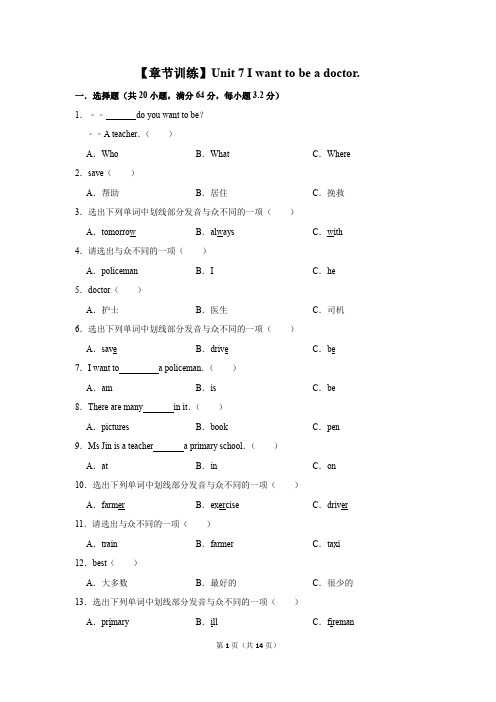
【章节训练】Unit 7 I want to be a doctor.一.选择题(共20小题,满分64分,每小题3.2分)1.﹣﹣do you want to be?﹣﹣A teacher.()A.Who B.What C.Where 2.save()A.帮助B.居住C.挽救3.选出下列单词中划线部分发音与众不同的一项()A.tomorrow B.always C.with 4.请选出与众不同的一项()A.policeman B.I C.he 5.doctor()A.护士B.医生C.司机6.选出下列单词中划线部分发音与众不同的一项()A.save B.drive C.be7.I want to a policeman.()A.am B.is C.be 8.There are many in it.()A.pictures B.book C.pen 9.Ms Jin is a teacher a primary school.()A.at B.in C.on 10.选出下列单词中划线部分发音与众不同的一项()A.farmer B.exercise C.driver 11.请选出与众不同的一项()A.train B.farmer C.taxi 12.best()A.大多数B.最好的C.很少的13.选出下列单词中划线部分发音与众不同的一项()A.primary B.ill C.fireman14.请选出与众不同的一项()A.office B.factory C.worker 15.drive()A.驾驶B.栽种C.跳水16.请选出与众不同的一项()A.very B.interestingC.save17.He is a bus.()A.drive B.driveing C.driving 18.fire()A.火,火灾B.五C.消防员19.请选出与众不同的一项()A.drive B.driver C.nurse20.选出下列单词中划线部分发音与众不同的一项()A.visitor B.form C.doctor二.填空题(共10小题,满分32分,每小题3.2分)21.He is the best teacher in the primary school..22.Do you want to be an office worker?.23.Look at this picture..24.例:A:What do you want to be?B:I want to be an office worker.A:B:.25.A:B:.26.When I'm 22 years old,I want to be a policeman..27.A:B:.28.It's very interesting..29.A:B:.30..三.阅读理解(共1小题,满分4分,每小题4分)31.Tingting is 11.She has some good friends.Tingting wants to be a nurse.She wants to help people who can not see.Joe wants to be a teacher.He wants to hel p students to learn many things.John wants to be a policeman.LiLei wants to be a farmer.JieJie wants to be a singer.根据短文内容判断正(√)误(×).1.Tingting is twelve years old.2.She wants to be a doctor.3.John wants to be a teacher.4.LiLei wants to be a policeman.5.JieJie wans to be a singer..【章节训练】Unit 7 I want to be a doctor.-1参考答案与试题解析一.选择题(共20小题,满分64分,每小题3.2分)1.﹣﹣do you want to be?﹣﹣A teacher.()A.Who B.What C.Where【分析】你想要做什么工作?一位老师.【解答】答案:B.该题考查疑问词的辨析.Who谁,What什么,Where哪儿.根据答语"A teacher"推测上句句意:你想要做什么工作?用What提问.故选:B.【点评】在明确三个疑问词的含义的基础上结合语境正确作答.2.save()A.帮助B.居住C.挽救【分析】save挽救.【解答】答案:C.该题考查单词翻译.帮助help,居住live,save挽救.故选:C.【点评】解答该题的关键是平时注意英语词汇的积累.3.选出下列单词中划线部分发音与众不同的一项()A.tomorrow B.always C.with【分析】tomorrow明天,always一直,with与,和.【解答】答案:A.考查字母发音,字母"w"在单词"tomorrow"中不发音,字母"w"在单词"always"中发[w],字母"w"在单词"with"中发[w],B,C发音相同,故选A.【点评】语音题要求掌握学生掌握基础语音知识,如48个国际音标的读法,同时还要认读积累课本所学单词.4.请选出与众不同的一项()A.policeman B.I C.he【分析】policeman警察,I我,he他.【解答】答案:A.该题考查词性分类.policeman警察,I我,he他.BC是代词,A是名词.故选:A.【点评】根据题干要求,理解各个选项中名词的意思,找出不同类.5.doctor()A.护士B.医生C.司机【分析】doctor医生.【解答】答案:B.该题考查单词翻译.护士nurse,doctor医生,司机driver.故选:B.【点评】解答该题的关键是平时注意英语词汇的积累.6.选出下列单词中划线部分发音与众不同的一项()A.save B.drive C.be【分析】save拯救,节约,drive驾驶,be系动词原形.【解答】答案:C.考查字母发音,字母"e"在单词"save"中不发音,字母"e"在单词"drive"中不发音,字母"e"在单词"be"中发[i:],A,B发音相同,故选C.【点评】语音题要求掌握学生掌握基础语音知识,如48个国际音标的读法,同时还要认读积累课本所学单词.7.I want to a policeman.()A.am B.is C.be【分析】我想要成为一名警察.【解答】答案:C.本题考查动词的形式."want to do sth"意为"想要做某事",to后跟动词原形be,故选C.【点评】掌握动词"want"的含义及用法,学习中不断积累常用的动词,了解动词的词性及用法.8.There are many in it.()A.pictures B.book C.pen【分析】它里面有很多图画.【解答】答案:A.本题考查可数名词的复数形式.pictures图画,复数形式;book书,单数形式;pen钢笔,单数形式;many的含义是很多,后跟可数名词复数形式,只有pictures是复数形式,故选A.【点评】可数名词单数变复数,要知道其规则变化,一般情况下直接加s,以s、x、sh、ch结尾,直接加es,以辅音字母加y结尾,将y变为i加es,以f或fe结尾的单词,将f或fe变为v加es等,结合题意选出正确答案.9.Ms Jin is a teacher a primary school.()A.at B.in C.on【分析】金女士是一名小学老师.【解答】答案:B.考查地点介词的运用.本题句意是:金女士是一名小学教师."at school"是指"在学校,在上学",是相对于在家里或者校外而言;"in school"指"在求学,在上学",相对于有工作而言;"in a school"指"在学校里",不一定是上学,也可能是工作,找人.题干中"Ms Jin is a teacher"表明金女士是一名教师,就是说不一定是求学,所以用"in","in a primary school"指"在一所小学校".故此题选B.【点评】除了掌握地点介词的基本用法,还要了解它们的一些特殊用法.如:"in hospital"是指"住院"(生病了住院);"in the hospital"指"在医院"(工作或探视等).正确的辨析才不至于在运用时出错.10.选出下列单词中划线部分发音与众不同的一项()A.farmer B.exercise C.driver【分析】farmer农民,exercise练习,driver司机.【解答】答案:B.考查字母发音,字母"er"在单词"farmer"中发[ə],字母"er"在单词"exercise"中发[ə:],字母"er"在单词"driver"中发[ə],A,C发音相同,故选B.【点评】语音题要求掌握学生掌握基础语音知识,如48个国际音标的读法,同时还要认读积累课本所学单词.11.请选出与众不同的一项()A.train B.farmer C.taxi【分析】train火车,farmer农场,taxi出租车.【解答】答案:B该题考查类别分类.train火车,farmer农民,taxi出租车.AC属于交通工具,B是职业.故选:B.【点评】解答该题的关键是记忆常见的英语单词.12.best()A.大多数B.最好的C.很少的【分析】best最好的.【解答】答案:B.该题考查单词翻译.大多数most,best最好的,很少的few.故选:B.【点评】解答该题的关键是积累英语词汇.13.选出下列单词中划线部分发音与众不同的一项()A.primary B.ill C.fireman【分析】primary小学,ill生病的,fireman消防员【解答】答案:B.考查字母发音,字母"i"在单词"primary"中发[ai],字母"i"在单词"ill"中发[i],字母"i"在单词"fireman"中发[ai],A,C发音相同,故选B.【点评】语音题要求掌握学生掌握基础语音知识,如48个国际音标的读法,同时还要认读积累课本所学单词.14.请选出与众不同的一项()A.office B.factory C.worker【分析】office办公室,factory工厂,worker工人.【解答】答案:C.该题考查类别分类.office办公室,factory工厂,worker工人.AB属于场所,C属于人物.故选:C.【点评】了解各个选项词性及意思,再结合题干要求找出不同类.15.drive()A.驾驶B.栽种C.跳水【分析】drive驾驶.【解答】答案:A.该题考查单词翻译.drive驾驶,栽种plant,跳水dive.故选:A.【点评】解答该题的关键是识记积累常用的单词.16.请选出与众不同的一项()A.very B.interestingC.save【分析】very十分的;interesting有趣的;save救.【解答】答案:C.本题考查词性分类.由于very(十分的)和interesting(有趣的)是形容词,而save是动词,故选C.【点评】本题的解题关键是既要理解词义,又要懂得词性的分类,才能正确选择.17.He is a bus.()A.drive B.driveing C.driving【分析】他正在驾驶一辆公共汽车.【解答】答案:C.考查现在进行时,现在进行时结构:主语+be动词+doing+sth+其它,A.drive动词原形,驾驶,B.driveing拼写错误,C.driving现在分词,正在驾驶,故选C.【点评】现在进行时考查要求看准句子主要成分,进行分析,理解句意,按照要求完成句子变化.18.fire()A.火,火灾B.五C.消防员【分析】fire火,火灾.【解答】答案:A.该题考查单词翻译.fire火,火灾.五five,消防员fireman.故选:A.【点评】解答该题的关键是积累英语词汇.19.请选出与众不同的一项()A.drive B.driver C.nurse【分析】drive驾驶,driver,司机,nurse护士.【解答】答案:A.该题考查单词类别分类.drive驾驶,driver,司机,nurse护士.BC属于职业,A是动词.故选:A.【点评】根据题干要求,理解各个选项中名词的意思,找出不同类.20.选出下列单词中划线部分发音与众不同的一项()A.visitor B.form C.doctor【分析】visitor游客,form形成,doctor医生【解答】答案:A.考查字母发音,字母"or"在单词"visitor"中发[ə],字母"or"在单词"form"中发[כ],字母"or"在单词"doctor"中发[ə],B,C发音相同,故选A.【点评】语音题要求掌握学生掌握基础语音知识,如48个国际音标的读法,同时还要认读积累课本所学单词.二.填空题(共10小题,满分32分,每小题3.2分)21.He is the best teacher in the primary school.他是小学里最好的老师..【分析】他是小学里最好的老师.【解答】答案:他是小学里最好的老师.本题考查英译汉.He他,is是,the best teacher最好的老师,in the primary school在小学里.结合整句与中文的表达习惯,翻译为"他是小学里最好的老师.".【点评】做翻译类题目,可以先把认识的词汇和短语翻译出来,然后仔结合中文的表达习惯,组织语言,连成连贯的句子.22.Do you want to be an office worker?你想成为一名办公室职员吗?.【分析】你想成为一名办公室职员吗?【解答】答案:你想成为一名办公室职员吗?本题考查英译汉.Do助动词,you你,want to be想成为,an office worker一名办公室职员,结合整句与中文的表达习惯,翻译为"你想成为一名办公室职员吗?".【点评】做翻译类题目,可以先把认识的词汇和短语翻译出来,然后仔结合中文的表达习惯,组织语言,连成连贯的句子.23.Look at this picture.看这张照片.【分析】Look at this picture.看这张照片.【解答】答案:看这张照片.本题考查英译汉.Look at看,this picture这张照片,结合整句与中文的表达习惯,翻译为"看这张照片.".【点评】做翻译类题目,可以先把认识的词汇和短语翻译出来,然后仔结合中文的表达习惯,组织语言,连成连贯的句子.24.例:A:What do you want to be?B:I want to be an office worker.A:What do you want to be?B:I want to be a farmer..【分析】A:你想成为什么?B:我想成为一名农民.【解答】答案:A:What do you want to be?B:Iwant to be a farmer.考查仿写句子.例句中What do you want to be?意为:你想成为什么.询问他人想从事什么职业.回答是:I want to be a/an+表示职业的名词.意为:我想要成为…,图片中是一位农民,所以"我想成为一名农民"可以表示为:I want to be a farmer.【点评】本题主要考查询问想从事的职业和对它的回答.通过做题了解此句式结构和句子的意思,掌握此句式的用法.25.A::What do you want to be?B:I want to be a worker..【分析】A:你想要成为什么?B:我想要成为一名工人.【解答】答案:A:What do you want to be?B:I want to be a worker.考查仿写句子.例句中What do you want to be?意为:你想成为什么样的人.询问他人想从事什么职业.回答是:I want to be a/an+表示职业的名词.意为:我想要成为…,图片中是一名工人,所以"我想成为一名工人"表示为:I want to be a worker.【点评】仿写句子时,先了解例句的句式结构,要表达的意思;再根据所给图片或单词进行仿写.26.When I'm 22 years old,I want to be a policeman.当我22岁时,我想成为一名警察..【分析】当我22岁时,我想成为一名警察.【解答】答案:当我22岁时,我想成为一名警察.本题考查英译汉.When当…时候,I'm我是,22 years old22岁,I我,want to be想成为,a policeman一名警察,结合整句与中文的表达习惯,翻译为"当我22岁时,我想成为一名警察.".【点评】做翻译类题目,可以先把认识的词汇和短语翻译出来,然后仔结合中文的表达习惯,组织语言,连成连贯的句子.27.A:What do you want to be?B:I want to be a nurse.【分析】你想要成为什么样的人?我想要成为一名护士.【解答】答案:A:What do you want to be?B:I want to be a nurse.考查仿写句子.例句中A:What do you want to be?意为:你想成为什么样的人.询问他人想从事什么职业.回答是:I want to be a/an+表示职业的名词.意为:我想要成为…,图片中是一名护士nurse,所以"我想成为一名护士"表示为:I want to be a nurse.【点评】仿写句子时,先理解例句的句式结构,句型,表达的意思;再根据所给图片或单词进行仿写.28.It's very interesting.它很有趣..【分析】它很有趣.【解答】答案:它很有趣.本题考查英译汉.It's它是,very非常,interesting有趣的,结合整句与中文的表达习惯,翻译为"它很有趣.".【点评】做翻译类题目,可以先把认识的词汇和短语翻译出来,然后仔结合中文的表达习惯,组织语言,连成连贯的句子.29.A:What do you want to be B:I want to be a teacher..【分析】A:你想要成为什么?B:我想要成为一名教师.【解答】答案:A:What do you want to be?B:I want to be a teacher.考查句子仿写.例句中What do you want to be?意为:你想成为什么?询问他人将来想从事什么职业.回答是"I want to be a/an+表示职业的名词".意为"我想要成为…",图片中是一名教师,所以"我想成为一名教师"可以表示为:I want to be a teacher.故本题答案是A:What do you want to be?B:I want to be a teacher.【点评】考查仿写句子,主要是通过学生对句子的仿写,掌握某种句式的用法,所以在仿写时,先了解要仿写的句子的结构和用法,从而根据所给单词正确仿写.30.1.farmer,2.driver,3.worker,4.singer,5.computer programmer,6.fireman..【分析】农民farmer,司机driver,工人worker,歌手singer,电脑程序设计员computer programmer,消防员fireman.【解答】答案:1.farmer,2.driver,3.worker,4.singer,5.computer programmer,6.fireman.该题考查看图片写单词.1.图1是农民,农民的英文是"farmer",故是farmer.2.图2是司机,司机的英文是"driver",故是driver.3.图3是工人,工人的英文是"work",故是worker.4.图4是歌手,歌手的英文是"singer",故是singer.5.图5是电脑程序设计员,其英文是"computer programmer",故是computer programmer.6.图6是消防员,消防员的英文是"fireman",故是fireman.【点评】看图可知是考查职业类的名词,积累职业名词并记住是关键.三.阅读理解(共1小题,满分4分,每小题4分)31.Tingting is 11.She has some good friends.Tingting wants to be a nurse.She wants to help people who can not see.Joe wants to be a teacher.He wants to help students to learn many things.John wants to be a policeman.LiLei wants to be a farmer.JieJie wants to be a singer.根据短文内容判断正(√)误(×).1.Tingting is twelve years old.×2.She wants to be a doctor.×3.John wants to be a teacher.×4.LiLei wants to be a policeman.×5.JieJie wants to be a singer.√.【分析】婷婷11岁.她有一些朋友.婷婷想要成为一名护士.她想帮助那些看不见的人们.乔想成为一名教师.他想要帮助学生学习很多东西.乔想要成为一名警察.李磊想成为一名农民.杰杰想成为一名歌手.【解答】答案:1.×.考查细节理解题.根据文中"Tingting is 11."可知"婷婷11岁,不是12岁.",与原文表述不一致,故填×.2.×.考查细节理解题.根据文中"Tingting wants to be a nurse."可知"她想成为一名护士,不是一名医生",与原文表述不一致,故填×.3.×.考查细节理解题.根据文中"John wants to be a policeman."可知"John是想当警察,不是当教师",与原文表述不一致,故填×.4.×.考查细节理解题.根据文中"LiLei wants to be a farmer."可知"李磊想当农民,不是警察,",与原文表述不一致,故填×.5.√.考查细节理解题.根据文中"JieJie wants to be a singer."可知"杰杰想当歌手",与原文表述一致,故填√.【点评】阅读分析要求学生看准阅读短文的内容,理解题目的意思,结合题目在原文中仔细寻找,并进行标注.。
高中英语重点单词拓展训练

高中英语重点单词拓展训练1. Abound: (v) to exist in large numbers or amounts; to be plentifulExample: Opportunities for success abound in this city.2. Abstract: (adj) existing in thought or as an idea but not having a physical or concrete existenceExample: The concept of love is abstract and can mean different things to different people.3. Accommodate: (v) to provide lodging or make room for; to adapt or adjust to suitExample: The hotel can accommodate up to 200 guests.4. Accurate: (adj) correct in all details; exactExample: Make sure your measurements are accurate before cutting the fabric.5. Acquire: (v) to gain or obtain possession of somethingExample: He acquired a new skill through years of practice.6. Adapt: (v) to adjust or modify to fit one's environment or circumstancesExample: She quickly adapted to the new school after moving to adifferent city.7. Adequate: (adj) enough or satisfactory for a particular purposeExample: The facilities provided were adequate for the needs of the students.8. Aesthetic: (adj) concerned with beauty or the appreciation of beautyExample: She has a great aesthetic sense and can create stunning works of art.9. Affluent: (adj) having a great deal of money; wealthyExample: The neighborhood is known for its affluent residents and luxurious houses.10. Aggravate: (v) to make a problem, injury, or offense worse or more seriousExample: Talking loudly during the movie only aggravated the already annoyed audience.11. Alleviate: (v) to make suffering, hardship, or a problem less severeExample: The medicine helped alleviate the pain in her knee.12. Allude: (v) to suggest or mention something indirectly or without explicit referenceExample: The book alludes to a famous historical event but never explicitly mentions it.13. Ambiguous: (adj) open to more than one interpretation; unclear or uncertainExample: His response was ambiguous, leaving us unsure of his true intentions.14. Ample: (adj) enough or more than enough; plentifulExample: We have ample time to get to the airport, so there's no need to rush.15. Analyze: (v) to examine or study something in detail, typically for purposes of explanation or interpretationExample: The scientist analyzed the data to identify patterns and trends.16. Anecdote: (n) a short and amusing or interesting story about a real incident or personExample: The speaker shared an anecdote about a funny experience he had while traveling.17. Animosity: (n) a strong feeling of dislike or hatredExample: There is a long history of animosity between the two rival teams.18. Anticipate: (v) to expect or predict something will happenExample: She anticipated that it would rain, so she brought an umbrella.19. Apprehensive: (adj) anxious or fearful about what may happenExample: He was apprehensive about starting his new job.20. Articulate: (adj) having the ability to speak fluently and coherently; expressing oneself clearlyExample: The professor was known for his articulate lectures on philosophy.21. Ascertain: (v) to find out for sure; to discover with certaintyExample: The detective worked tirelessly to ascertain the truth behind the crime.22. Assert: (v) to state a fact or belief confidently and forcefullyExample: She asserted that she was innocent of the crime.23. Assess: (v) to evaluate or estimate the nature, ability, or quality of somethingExample: The teacher will assess the students' understanding through a final exam.24. Assimilate: (v) to absorb and integrate into a wider society or cultureExample: Immigrants often struggle to assimilate into a new country.25. Attest: (v) to provide clear evidence or proof; to declare to be genuine or trueExample: The witness attested to seeing the suspect at the scene of the crime.26. Attribute: (v) to regard as being caused by; to ascribeExample: She attributes her success to hard work and determination.27. Augment: (v) to make something greater by adding to it; to increaseExample: He augmented his income by taking on a part-time job.28. Authentic: (adj) genuine; real; true to its type or originExample: The painting was determined to be an authentic work by a famous artist.29. Avid: (adj) having a strong interest or enthusiasm for somethingExample: He is an avid reader and can finish several books in a week.30. Bias: (n) a prejudice in favor of or against one thing, person, or group compared with another, usually in a way considered to be unfairExample: The journalist's article showed a clear bias against the political candidate.31. Brevity: (n) concise and exact use of words in writing or speechExample: The presenter's brevity ensured that the audience stayed engaged.32. Candid: (adj) truthful and straightforward; frankExample: He appreciated her candid response to his question.33. Catalyst: (n) a person or thing that precipitates an event or changeExample: The invention of the smartphone was a catalyst forsignificant advancements in technology.34. Cite: (v) to refer to a source of information as evidence or proofExample: The student cited several scientific studies to support her argument.35. Clarify: (v) to make something clear or easier to understand; to explainExample: Could you please clarify your instructions? I'm not sure what you mean.36. Coherent: (adj) logical and consistent; easy to understandExample: His essay was well-written and coherent, making it easy to follow his arguments.37. Collaborate: (v) to work together with others on a project or taskExample: The team members collaborated to complete the project ahead of schedule.38. Commend: (v) to praise or express approval for someone's achievements or behaviorExample: The teacher commended the student for her hard work and dedication.39. Compassion: (n) sympathetic pity and concern for the sufferings or misfortunes of othersExample: The nurse showed compassion towards the patients in the hospital.40. Complement: (v) to complete or make perfectExample: His skills complemented hers, enabling them to work well together.41. Compose: (v) to create or write a piece of music, literature, or artExample: The artist composed a beautiful painting inspired by nature.42. Compound: (v) to make something worse; to intensifyExample: The stress of work compounded his already difficult situation.43. Comprehensive: (adj) including all or nearly all elements or aspects of somethingExample: She wrote a comprehensive report that covered all the important details.44. Conceal: (v) to keep from sight; to hideExample: He tried to conceal his disappointment with a smile.45. Concede: (v) to admit that something is true or valid after first denyingitExample: After a lengthy argument, he finally conceded defeat.46. Conceive: (v) to form or devise a plan, idea, or concept in one's mindExample: She conceived a brilliant invention that revolutionized the industry.47. Concise: (adj) giving a lot of information clearly and in a few wordsExample: The professor's lecture was concise yet informative.48. Concur: (v) to be of the same opinion; to agreeExample: The committee concurred with the proposal and approved it unanimously.49. Condense: (v) to make something denser or more concentrated; to reduce in volume or sizeExample: The article was condensed into a shorter version for the magazine.50. Confer: (v) to grant or bestow a particular title, degree, or honorExample: The university conferred an honorary degree upon the distinguished scientist.51. Confine: (v) to keep or restrict someone or something within certainlimits or boundariesExample: The prisoner was confined to his cell for the duration of hissentence.52. Configure: (v) to arrange or set up in a particular wayExample: The IT specialist configured the computer network for optimal performance.53. Confirm: (v) to establish the truth, accuracy, or validity of somethingExample: The lab results confirmed the doctor's diagnosis.54. Congenial: (adj) pleasant or agreeable; suited to one's taste or temperamentExample: The small town had a congenial atmosphere that made visitors feel welcome.55. Connotation: (n) an idea or feeling that a word invokes in addition to its literal or primary meaningExample: The word "home" has positive connotations of warmth and comfort.56. Consecutive: (adj) following continuously in order; uninterruptedExample: She won three consecutive gold medals in the Olympic Games.57. Consensus: (n) a general agreement or opinion among a group of peopleExample: The team reached a consensus on the best approach to solve the problem.58. Consequence: (n) a result or effect of an action or conditionExample: The consequence of his reckless behavior was losing hisdriver's license.59. Conserve: (v) to protect from harm or destruction; to keep in a safe or sound stateExample: We need to conserve water during the drought.60. Considerate: (adj) showing concern for the needs and feelings of others; thoughtfulExample: He is always considerate and offers to help whenever he can.61. Consolidate: (v) to combine or unite into a single whole; to strengthen or make secureExample: The company decided to consolidate its operations to reduce62. Contemplate: (v) to think deeply or carefully about somethingExample: She sat by the window and contemplated the meaning of life.63. Contemporary: (adj) living or occurring at the same time; belonging to the same time periodExample: His art is considered contemporary and reflects current trends.64. Contradict: (v) to assert the opposite of; to deny or disagree with what someone else has saidExample: Her statement contradicted the evidence presented in court.65. Contrary: (adj) opposite in nature, direction, or meaningExample: Her actions were contrary to her words, causing confusion.66. Contrast: (v) to compare in order to show differences; to set in opposition or as a counterpointExample: The black dress contrasts beautifully with her fair complexion.67. Controversial: (adj) causing disagreement or dispute; likely to arouse argument or debateExample: The politician's controversial statement sparked a heated debate.68. Convenient: (adj) fitting in well with a person's needs, activities, and plans; suitable for one's purposesExample: The location of the new store is convenient for shoppers in the area.69. Convey: (v) to transport or carry to a place; to make an idea, feeling, or impression known or understandable to someoneExample: The picture conveys the artist's emotions and captures the viewer's attention.70. Conviction: (n) a firmly held belief or opinionExample: She spoke with such conviction that everyone believed her.71. Corroborate: (v) to confirm or give support to a statement, theory, orExample: The witness corroborated the victim's account of the incident.72. Counteract: (v) to act against something in order to reduce its force or neutralize its effectExample: Eating healthy meals can help counteract the negative effects of stress.73. Credible: (adj) able to be believed; convincingExample: The witness provided credible evidence to support her claims.74. Culminate: (v) to reach a climax or point of highest developmentExample: The concert culminated in a breathtaking fireworks display.75. Cultivate: (v) to prepare and use land for crops or gardening; to develop or improve by education or trainingExample: She cultivated a beautiful garden filled with colorful flowers.76. Cumbersome: (adj) large or heavy and therefore difficult to carry or use; unwieldyExample: The old typewriter was cumbersome compared to the lightweight laptop.77. Deceive: (v) to cause someone to believe something that is not true; to misleadExample: He deceived her into thinking he was a wealthy businessman.78. Deduce: (v) to arrive at a conclusion by reasoning from known facts or observationsExample: From the evidence presented, the detective deduced that it was a premeditated crime.79. Deficit: (n) the amount by which something, especially a sum of money, is too small or falls shortExample: The company had a budget deficit and had to make cutbacks.80. Deplete: (v) to use up the supply or resources of; to exhaustExample: The factory depletes the nearby river of its clean water.81. Depict: (v) to show or represent by a drawing, painting, or other art formExample: The mural depicts scenes from the city's history.82. Derive: (v) to obtain or receive something from a specified sourceExample: She derives great joy from playing the piano.83. Desolate: (adj) deserted of people and in a state of bleak and dismal emptinessExample: The abandoned house stood desolate on the hilltop.84. Detriment: (n) the state of being harmed or damaged; a cause of harm or damageExample: The excessive use of smartphones can be a detriment to one's mental health.。
牛津译林版八年英语Unit4拓展提优训练(有答案)

牛津译林版八年英语Unit4拓展提优训练(有答案)牛津译林版8B Unit4拓展提优练习卷一、根据中文或英文释义写出单词1.Sometimes life is like a travelling__________(舞台).2.—Where are my wet clothes.please? —Oh,look! Your motheris_________(悬挂)them on the line.3.It was a _____________ (tire) day and he felt ________________ (tire). 4.When the two friends met again after several years, they ____ (重新开始) their friendship. 5.If Simon don’t go to the meeting, I won’t go, ___________________ (也). 6.Guojingming is one of my favourite _____________ (write). The books by him touch me. 7.It is____________ to sit here without doing anything so we feel ___________ (bore). 8.In ______________(德国), there are different kinds of high schools. 9.The ____________ book by two __________ (Germany) touches me deeply. 10.–Have you ever enjoyed those famous _____________(戏剧)?__No, it’s a pity. 11.Do you think Wang Gang is one of thebest__________(act).12 They waited and waited for something_____________(令人兴奋的)to happen. 13.The election(选举)was the main________(大事)of 1999 in that country.14.I_________(called)you last night,but no one answered me.15.Everyone said these________(表演者)_______(表演)very well in the film.16.What are you going to do with these useless________?(good) 17.We should do the work betterwith__________money and fewer people.(little) 18.What’s his_________? Can you describe what he looks like?(appear) 二、用动词的正确时态填空 1 The book he is looking forward to___________(e)out at the end of next month. 2.Listen! How wonderfully he_________(play)the piano.3.There_________(be)a wonderful film in that cinema tonight,isn’ there? 4 More attention should be paid to__________(build)the nature reserves in Western China. 5 –Excuse me,when can we play tennis at the court?__Not until it__________(repair)this weekend. 6.We_________(have)an important meeting tonight,shan’t we? 7.How time flies! Nearly three years________(pass)since we came here.8 She prefers___________(take)the subway to work rather than drive in such bad weather. 9 My brother doesn’t mind _______ (share) his bedroom with me. 10 More than a man______ (fall)over the rock on the road since seven o`clock this morning .11.________ you ________ (plan)how to organize a show at this time yesterday? 12.Lily couldn’t stop ________ (cry) when she heard the bad news.三、选择填空1.Of all the girls Mary spent_________time and made__________mistakes.A.less,fewer B.much.many C.the least,the fewest D.more,most 2.It is_________to work out tile problem.You needn’t go to the teacher.A.enough easy B.easy enough C.easily enough D.very easily 3.A bridge has beenbuilt__________people cross the river.A.helping B.to help C.help D.helps 4__ Please __________ the paper, Jimmy! __ But I haven’t checked it yet, Mr. Black. A. hand in B. take out C. look at D. go through 5The teachers hope all of us can hand _____ our homework ___________ time every day. A. up; in B. out; on C. on; in D. in; on 6.My wife often forgets _______the door, but she remembered ____it when she left yesterday.A.closing,close B.to close,close C.closing,to close D.to close,closing 7.He looked________at me and asked why I looked so_________.A.sad,sad B.sad,sadly C.sadly,sad D.sadly,sadly 8.—Where____you______,Mike? —To the library.I borrowed some books.A.are,going B.do,go C.have,gone D.have,been 9.Can you show me__________? A.what to do with this Physics problem B.how to do with this Physics problem C.how do I do with this Physics problem D.what do I do with this Physics problem 10 Mike, you ______ play with fire. You __________ burn yourself. A won’t; can’t B. mustn’t; may C. don’t have to; must D. have got to; shouldn’t 11__ Where’s my umbrella? __ It’s fine today. You ____________ take an umbrella with you.A. can’tB. needn’tC. mustn’tD. shouldn’t 12 I’m sorry. I ____________ go now. My father told me on the phone that my mother was ill. A. must B. have to C. may D. think 13.I think it’s _______ useful advice on his further English studies. A. a B. an C. some D. / 14.If you go swimming tomorrow, I will go ________. If you don’t, I won’t ____________. A. also; too B. too; eitherC. as well; tooD. too; as well 15.―Can you catch what I said? ―Sorry, I can understand it because you speak very quickly. A. almost B. probably C. mostly D. hardly 四、阅读理解。
Unit 2 拓展训练2022-2023学年人教版英语九年级全册
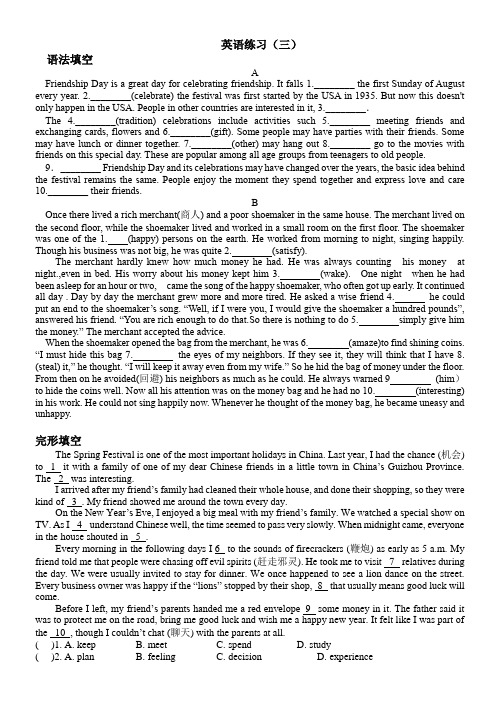
英语练习(三)语法填空AFriendship Day is a great day for celebrating friendship. It falls 1.________ the first Sunday of August every year. 2.________(celebrate) the festival was first started by the USA in 1935. But now this doesn't only happen in the USA. People in other countries are interested in it, 3.________.The 4.________(tradition) celebrations include activities such 5.________ meeting friends and exchanging cards, flowers and 6.________(gift). Some people may have parties with their friends. Some may have lunch or dinner together. 7.________(other) may hang out 8.________ go to the movies with friends on this special day. These are popular among all age groups from teenagers to old people.9.________ Friendship Day and its celebrations may have changed over the years, the basic idea behind the festival remains the same. People enjoy the moment they spend together and express love and care 10.________ their friends.BOnce there lived a rich merchant(商人) and a poor shoemaker in the same house. The merchant lived on the second floor, while the shoemaker lived and worked in a small room on the first floor. The shoemaker was one of the 1.(happy) persons on the earth. He worked from morning to night, singing happily. Though his business was not big, he was quite 2.(satisfy).The merchant hardly knew how much money he had. He was always counting his money at night.,even in bed. His worry about his money kept him 3.(wake). One night when he had been asleep for an hour or two, came the song of the happy shoemaker, who often got up early. It continued all day .Day by day the merchant grew more and more tired. He asked a wise friend 4.he could put an end to the shoemaker’s song. “Well, if I were you, I would give the shoemaker a hundred pounds”, answered his friend. “You are rich enough to do that.So there is nothing to do 5.simply give him the money.” The merchant accepted the advice.When the shoemaker opened the bag from the merchant, he was 6.(amaze)to find shining coins. “I must hide this bag 7.the eyes of my neighbors. If they see it, they will think that I have 8. (steal) it,” he thought. “I will keep it away even from my wife.” So he hid the bag of money under the floor. From then on he avoided(回避) his neighbors as much as he could. He always warned 9(him)to hide the coins well. Now all his attention was on the money bag and he had no 10.(interesting) in his work. He could not sing happily now. Whenever he thought of the money bag, he became uneasy and unhappy.完形填空The Spring Festival is one of the most important holidays in China. Last year, I had the chance (机会) to 1 it with a family of one of my dear Chinese friends in a little town in China’s Guizhou Province. The 2 was interesting.I arrived after my friend’s family had cleaned their whole house, and done their shopping, so they were kind of 3 . My friend showed me around the town every day.On the New Year’s Eve, I enjoyed a big meal with my friend’s family. We watched a special show on TV. As I 4 understand Chinese well, the time seemed to pass very slowly. When midnight came, everyone in the house shouted in 5 .Every morning in the following days I 6 to the sounds of firecrackers (鞭炮) as early as 5 a.m. My friend told me that people were chasing off evil spirits (赶走邪灵). He took me to visit 7 relatives during the day. We were usually invited to stay for dinner. We once happened to see a lion dance on the street. Every business owner was happy if the “lions” stopped by their shop, 8 that usually means good luck will come.Before I left, my friend’s parents handed me a red envelope 9 some money in it. The father said it was to protect me on the road, bring me good luck and wish me a happy new year. It felt like I was part of the 10 , though I couldn’t chat (聊天) with the parents at all.( )1. A. keep B. meet C. spend D. study( )2. A. plan B. feeling C. decision D. experience( )3. A. relaxed B. shocked C. safe D. shy( )4. A. needn’t B. shouldn’t C. couldn’t D. mustn’t( )5. A. surprise B. worry C. loneliness D. excitement( )6. A. woke up B. set up C. gave up D. put up( )7. A. my B. his C. our D. their( )8. A. or B. but C. though D. because( )9. A. of B. for C. with D. from( )10. A. luck B. year C. family D. tradition阅读理解AThere are many stories about the start of Nian. It is said that Nian was a fierce monster. Usually it stayed deep in the mountains. But in winter, it couldn’t find enough food. So it entered villages to eat whatever it could catch. Villagers became frightened and moved away. Later the people found that Nian was afraid of three things—the red color, the bright fire and the loud noise. After learning this, they thought of how to prevent Nian from entering their villages. Thus, a tradition was established. People had couplets, lanterns and fireworks for the Spring Festival.Now most people in the countryside still keep these traditional celebrations. However, the people in cities have used new ways to celebrate the Spring Festival. For example, they don’t send out so many greeting cards as before. Instead they usually send short text messages to greet friends on mobile phones. And for safety, fireworks were not allowed in some large cities a few years ago, making the cities much quieter than before. It seems that all Chinese traditions are facing new challenges. Maybe when the children of the next generation grow up, they can only learn about Chinese traditions from books. 1.Long ago, people thought Nian was ______.A.serious B.friendly C.interesting D.dangerous2.People set off fireworks because Nian was afraid of ______.A.loud noise B.red color C.people D.animals3.Now people ______ to greet their friends at the Spring Festival.A.write letters B.play cards C.prefer to use mobiles D.send telegraphs 4.Setting off fireworks is not allowed in some large cities in order to ______.A.make the cities quiet B.save money C.keep safe D.keep clean5.What does the underlined sentence in the passage mean?A.Chinese people will not have the Spring Festival any longer.B.Perhaps Chinese people won’t celebrate the Spring Festival in traditional ways.C.It’s clear that Chinese traditions will disappear.D.Chinese people dislike the Spring Festival.BApril Fool’s Day is coming! But do you know how April Fool’s Day comes?In the sixteenth century in France, the start of the New Year was on April 1st. People celebrated the New Year in the same way as it is today. They held parties and danced into the late night.Then in 1562, Pope Gregory introduced a new calendar into the Christian(基督教的)world, and the new year fell on January 1st. Some people didn’t believe the change in the date, so they celebrated the New Year on April 1st. Others played tricks on them and called them “April fools”.Today Americans play small tricks on friends on the first day of April. One common trick on April Fool’s Day is pointing down to a friend’s shoe and saying, “Your shoelace is untied.” School children like to tell a classmate that there are no classes. Then if someone believes the trick, he or she will be called the “April fool”! People play tricks on each other only because they want to enjoy themselves together. Most jokes are really funny and people play tricks not to hurt anyone but to find happiness.根据短文内容,选择最佳答案。
七年级英语提升方案及措施
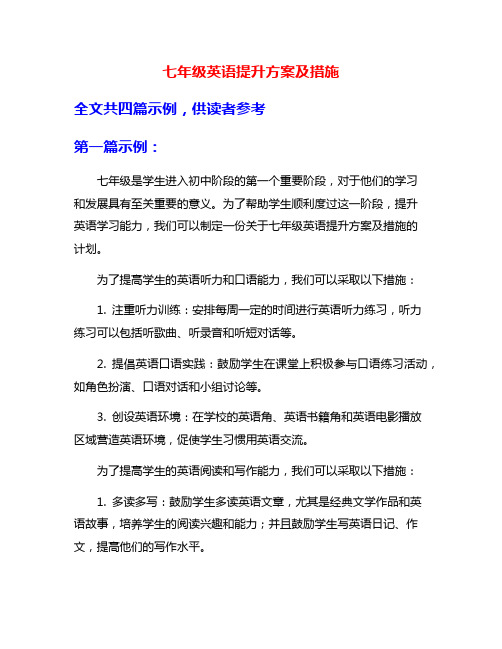
七年级英语提升方案及措施全文共四篇示例,供读者参考第一篇示例:七年级是学生进入初中阶段的第一个重要阶段,对于他们的学习和发展具有至关重要的意义。
为了帮助学生顺利度过这一阶段,提升英语学习能力,我们可以制定一份关于七年级英语提升方案及措施的计划。
为了提高学生的英语听力和口语能力,我们可以采取以下措施:1. 注重听力训练:安排每周一定的时间进行英语听力练习,听力练习可以包括听歌曲、听录音和听短对话等。
2. 提倡英语口语实践:鼓励学生在课堂上积极参与口语练习活动,如角色扮演、口语对话和小组讨论等。
3. 创设英语环境:在学校的英语角、英语书籍角和英语电影播放区域营造英语环境,促使学生习惯用英语交流。
为了提高学生的英语阅读和写作能力,我们可以采取以下措施:1. 多读多写:鼓励学生多读英语文章,尤其是经典文学作品和英语故事,培养学生的阅读兴趣和能力;并且鼓励学生写英语日记、作文,提高他们的写作水平。
2. 专项训练:每周安排一些关于阅读理解和写作的专项训练课程,帮助学生熟悉英语文章的结构和写作技巧。
3. 评估和指导:定期对学生的阅读和写作作品进行评估,并给予指导和建议,帮助他们及时改正错误并提升表达能力。
为了提高学生的英语词汇量和语法知识,我们可以采取以下措施:1. 增加词汇量:设置每日单词背诵目标,通过背诵词汇书、使用记忆卡片等方式扩大学生的词汇量。
2. 巩固语法知识:设计针对不同语法知识点的练习题,帮助学生掌握基础的语法知识,并能够运用到实际的写作和口语中。
3. 语法点拓展:引导学生熟练掌握英语基础语法知识的鼓励他们参与更深入语法点的学习,如复合句、定语从句和虚拟语气等。
为了全方位提升学生的英语水平,我们可以采取以下综合措施:1. 加强课外拓展:组织学生参加英语角、英语活动和英语比赛,拓展学生的英语应用场景和提升综合能力。
2. 制定学习计划:在开学前指导学生制定个人学习计划,包括目标设定、时间规划和学习方法等,帮助他们有目标地提高英语能力。
强化英语实践教学 提升语言拓展训练——略谈初中英语课堂教学结构的优化
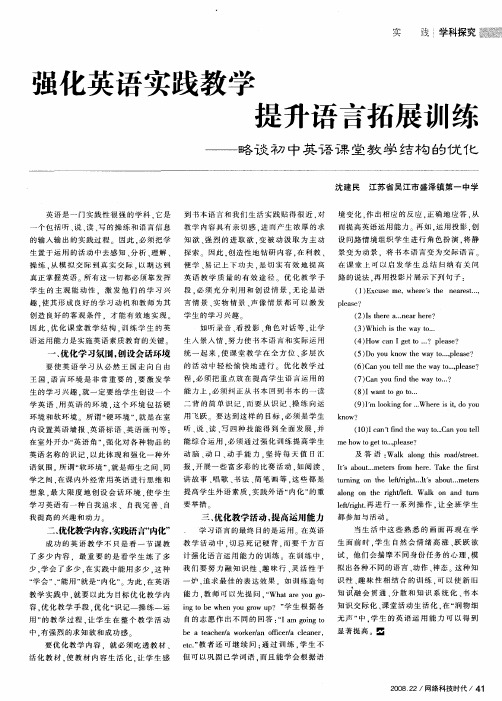
动 脑 、 口 、 手 能 力 . 持 每 天 值 日汇 动 动 坚
及 答 语 : l a n hsra /t e. Wak l g ti o ds e t o r
报 , 展 一 些 富多 彩 的 比赛 活 动 , 阅 读 、 I bo t 开 如 tS a u …mee s fo he e a e t e frt tr r m r .T k h s i
必须 纠 正 从 书 本 回 到 书 本 的 一 读 生 的 学 习 兴 趣 . 一 定 要 给 学 生 创 设 一 个 能 力 上 . 就 学 英 语 、 英 语 的 环 境 . 个 环 境 包 括 硬 用 这 环 境 和 软 环 境 所 谓 “ 环 境 ” 就 是 在 室 硬 . 二 背 的 简 单 识 记 . 要 从 识 记 、 练 向 运 而 操 用 飞 跃 要 达 到 这 样 的 目标 . 须 是 学 生 必 听 、 、 、 四种技 能得 到全面发展 , 说 读 写 并
一 、
如 听 录 音 、 投 影 、 色 对 话 等 , 学 看 角 让
生 人 景 人 情 . 力 使 书 本 语 言 和 实 际 运 用 努
( W hc stew yt… 3) ihi a o h
( Ho a e o…? p e s ? 4) w c n Ig t t la e
( ) lo igfr… eei , oy u 9 I o kn o Wh r si d o m t
ko n w?
内设 置 英 语 墙 报 、 语 标 语 、 语 画 刊 等 : 英 英
在 室 外 开 办 “ 语 角 ” 强 化 对 各 种 物 品 的 英 . 英 语 名 称 的识 记 . 以此 体 现 和 强 化 一 种 外
六年级六年级英语完形填空期末试卷拓展提高专项训练优质含答案
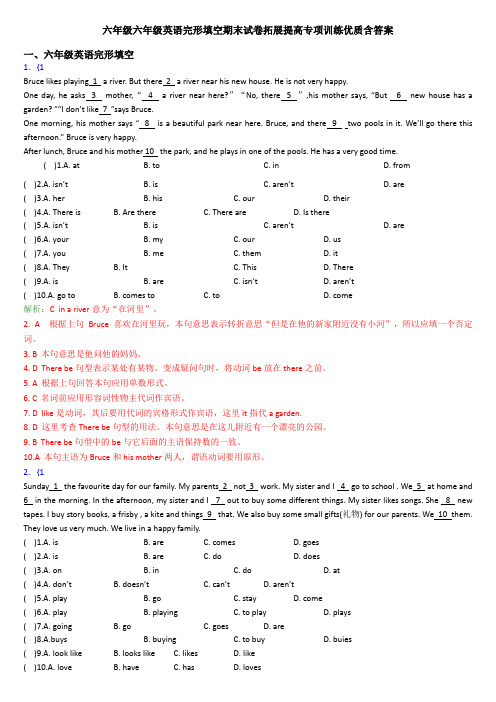
六年级六年级英语完形填空期末试卷拓展提高专项训练优质含答案一、六年级英语完形填空1.{1Bruce likes playing 1 a river. But there 2 a river near his new house. He is not very happy.One day, he asks 3 mother,“ 4 a river near here?”“No, there 5 ”,his mother says, “But 6 new house has a garden? ”“I don’t like 7 ”says Bruce.One morning, his mother says “ 8 is a beautiful park near here. Bruce, and there 9 two pools in it. We’ll go there this afternoon.” Bruce is very happy.After lunch, Bruce and his mother 10 the park, and he plays in one of the pools. He has a very good time.( )1.A. at B. to C. in D. from( )2.A. isn’t B. is C. aren’t D. are( )3.A. her B. his C. our D. their( )4.A. There is B. Are there C. There are D. Is there( )5.A. isn’t B. is C. aren’t D. are( )6.A. your B. my C. our D. us( )7.A. you B. me C. them D. it( )8.A. They B. It C. This D. There( )9.A. is B. are C. isn’t D. aren’t( )10.A. go to B. comes to C. to D. come解析:C in a river意为“在河里”。
英语提升方案

英语提升方案英语提升方案目标1.提高英语听力水平2.提高英语口语表达能力3.提升英语阅读和写作能力方案概述通过一系列的学习和练习活动,帮助学生全面提升英语水平。
学习计划听力提升•每天听英语原版新闻30分钟•每周听一次英语播客进行听力训练•定期参加英文电影或英语听力实验课程口语表达能力提升•每天练习口语,可以选择与外教进行对话或加入英语角活动•注重口语表达的准确性和流利度,注意语音语调的训练•阅读英文材料,进行朗读和模仿阅读和写作能力提升•阅读英文经典文学作品和专业书籍,培养阅读理解能力•写作练习,定期完成英文写作作业•注重词汇的积累,拓展词汇量学习资源和工具•英语学习网站和应用程序•英语学习社区和论坛•英语学习书籍和教材•英语学习课程和培训评估和反馈•定期进行英语水平评估,收集反馈和建议•根据评估结果进行调整和改进学习计划结束语本方案旨在帮助学生全面提升英语水平,通过持续的学习和练习,逐渐达到流利的口语和高水平的听说读写能力。
只有坚持不懈地学习,才能取得显著的进步。
加油!具体活动安排听力提升•每天听英语原版新闻30分钟:选择有字幕的新闻进行听力练习,逐渐提高听力理解能力。
•每周听一次英语播客:选择有主题的播客,跟随主持人对话,提高听力和跟读能力。
•定期参加英文电影或英语听力实验课程:通过观看电影或参加听力实验课程,提高听力水平和语感。
口语表达能力提升•每天练习口语:可以选择与外教进行对话或加入英语角活动。
与外教对话可以提高口语表达准确性和流利度,而英语角活动则提供与其他学习者交流的机会。
•注重口语表达的准确性和流利度:进行语音语调训练,注意语法和发音的正确性,积极参与口语活动,如短剧表演和辩论等。
•阅读英文材料,进行朗读和模仿:读英文文章时注意语调和语速,尝试模仿文章中的表达方式,提高口语表达能力。
阅读和写作能力提升•阅读英文经典文学作品和专业书籍:通过阅读经典文学作品和专业书籍,培养阅读理解能力和拓展词汇量。
英语口语提升学习方案
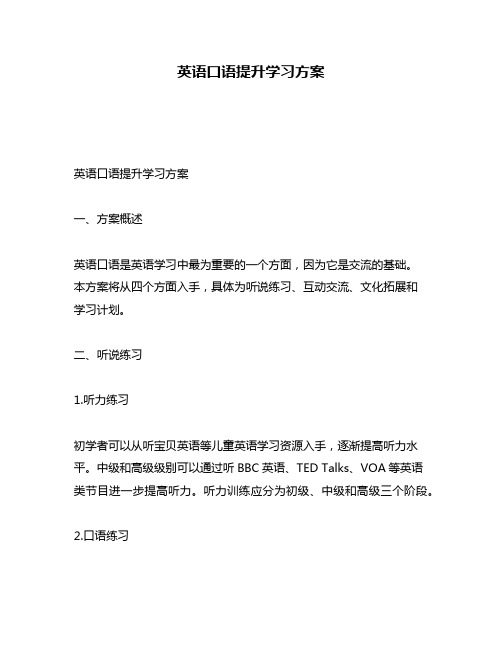
英语口语提升学习方案英语口语提升学习方案一、方案概述英语口语是英语学习中最为重要的一个方面,因为它是交流的基础。
本方案将从四个方面入手,具体为听说练习、互动交流、文化拓展和学习计划。
二、听说练习1.听力练习初学者可以从听宝贝英语等儿童英语学习资源入手,逐渐提高听力水平。
中级和高级级别可以通过听BBC英语、TED Talks、VOA等英语类节目进一步提高听力。
听力训练应分为初级、中级和高级三个阶段。
2.口语练习口语练习应与听力训练相辅相成。
初级阶段可以从模仿课外口语、背诵对话、模拟面对面对话入手。
中级学习者应重视学习流利地表达想法,包括口语强化对话、口语阅读、谈话练习等。
高级学习者可以参加口语实践活动,如英语角、辩论等。
三、互动交流1.在校园内加入语言交流组让学生在感性认识英语的过程中提高英语水平,学习组为自己打造本校区专属的交流平台,同学可以在这里找到共同的兴趣点和话题,将学习和交流融为一体。
2.开展语言互动活动通过举办讲座、座谈会、课程研讨等形式的活动,拓展学生的语言文化背景和口语交流技能,培养自信和勇气。
也可以举办以英语为主题的文化活动,如英文戏剧表演、诗歌朗诵会等。
四、文化拓展1.文化背景学习提供一些英语的阅读材料,加深学生对英语语言环境背景的了解,培养从言语表达中感知文化的敏感性。
同时,这也可以激发学生的兴趣,提高学生的英语阅读水平。
2.跨文化沟通技巧应当从文化差异入手,学会尊重不同的文化习惯和想法。
加强同学们的跨文化沟通技巧,帮助他们更好地融入国际社会,从而提高英语口语的水平。
五、学习计划学习计划很重要,每个学生都应当制定自己的学习计划。
学习计划可以包括听力、阅读、口语、写作等方面,建议每天至少学习1-2小时,每周不少于5小时,认真学习,坚持长期学习。
六、总结通过本方案的实施,可以让学生有更多的机会去推进他们的英语学习过程,并最终提高他们的英语口语水平。
让语言学习成为一个充满活力的、充满挑战的过程,从中提高自己的语言交流技能。
英语四级写作的思路拓展和训练方法
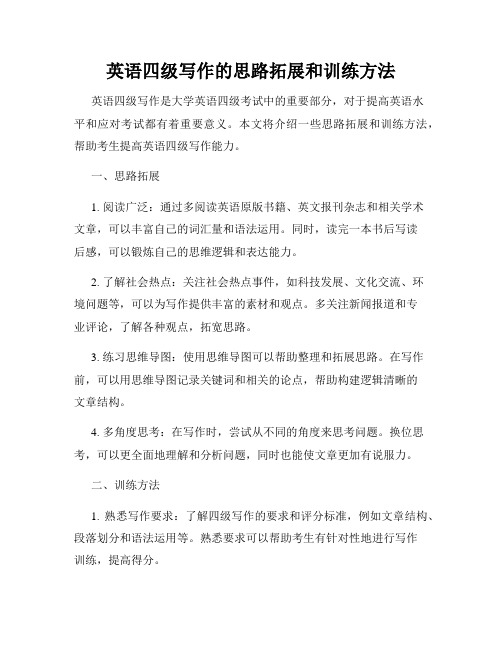
英语四级写作的思路拓展和训练方法英语四级写作是大学英语四级考试中的重要部分,对于提高英语水平和应对考试都有着重要意义。
本文将介绍一些思路拓展和训练方法,帮助考生提高英语四级写作能力。
一、思路拓展1. 阅读广泛:通过多阅读英语原版书籍、英文报刊杂志和相关学术文章,可以丰富自己的词汇量和语法运用。
同时,读完一本书后写读后感,可以锻炼自己的思维逻辑和表达能力。
2. 了解社会热点:关注社会热点事件,如科技发展、文化交流、环境问题等,可以为写作提供丰富的素材和观点。
多关注新闻报道和专业评论,了解各种观点,拓宽思路。
3. 练习思维导图:使用思维导图可以帮助整理和拓展思路。
在写作前,可以用思维导图记录关键词和相关的论点,帮助构建逻辑清晰的文章结构。
4. 多角度思考:在写作时,尝试从不同的角度来思考问题。
换位思考,可以更全面地理解和分析问题,同时也能使文章更加有说服力。
二、训练方法1. 熟悉写作要求:了解四级写作的要求和评分标准,例如文章结构、段落划分和语法运用等。
熟悉要求可以帮助考生有针对性地进行写作训练,提高得分。
2. 频繁练习:多进行写作练习,尤其是根据题目要求进行模拟写作。
可以通过背诵范文和写作模板来了解高分范围内的表达方式和写作技巧。
3. 注意语法和拼写:良好的语法和拼写是必备的基本素质。
在写作过程中,要注意避免语法错误和拼写错误,可以通过多读多写来提高自己的语感和注意力。
4. 寻求反馈:写作后可以请教老师或同学,寻求他们的建议和意见。
也可以参加英文写作讨论班或论坛,与他人共同探讨提高写作水平的方法和技巧。
三、总结通过思路拓展和训练方法,考生可以逐步提高英语四级写作能力。
阅读广泛、了解社会热点,思维导图和多角度思考可以帮助拓展写作思路;熟悉写作要求、频繁练习、注意语法和拼写,寻求反馈可以提升写作技巧和得分。
不断的练习和积累,相信大家在英语四级写作中会有很大的提升。
以上是关于英语四级写作的思路拓展和训练方法的介绍,希望对广大考生有所帮助。
高中英语课外拓展方案
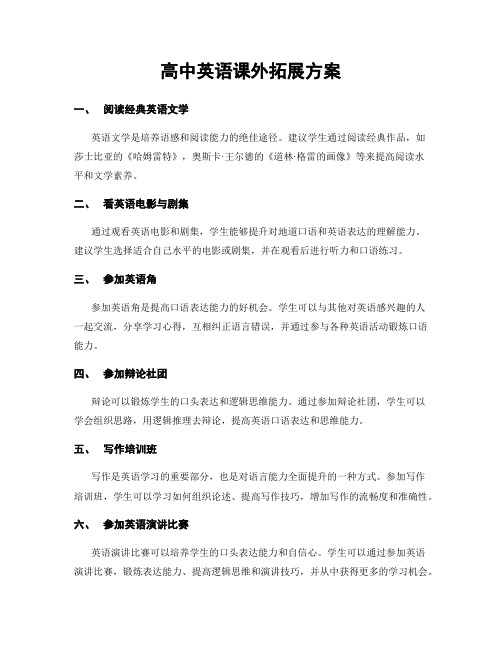
高中英语课外拓展方案一、阅读经典英语文学英语文学是培养语感和阅读能力的绝佳途径。
建议学生通过阅读经典作品,如莎士比亚的《哈姆雷特》,奥斯卡·王尔德的《道林·格雷的画像》等来提高阅读水平和文学素养。
二、看英语电影与剧集通过观看英语电影和剧集,学生能够提升对地道口语和英语表达的理解能力。
建议学生选择适合自己水平的电影或剧集,并在观看后进行听力和口语练习。
三、参加英语角参加英语角是提高口语表达能力的好机会。
学生可以与其他对英语感兴趣的人一起交流,分享学习心得,互相纠正语言错误,并通过参与各种英语活动锻炼口语能力。
四、参加辩论社团辩论可以锻炼学生的口头表达和逻辑思维能力。
通过参加辩论社团,学生可以学会组织思路,用逻辑推理去辩论,提高英语口语表达和思维能力。
五、写作培训班写作是英语学习的重要部分,也是对语言能力全面提升的一种方式。
参加写作培训班,学生可以学习如何组织论述、提高写作技巧,增加写作的流畅度和准确性。
六、参加英语演讲比赛英语演讲比赛可以培养学生的口头表达能力和自信心。
学生可以通过参加英语演讲比赛,锻炼表达能力、提高逻辑思维和演讲技巧,并从中获得更多的学习机会。
七、参观英语演出参观英语演出是拓展对英语艺术和文化的理解的好方法。
学生可以通过观看英语剧场、音乐会和舞蹈演出来体验不同形式的英语表达,增加对英语文化的了解。
八、参加语言交换活动与母语为英语的学生交流,对于提高口语表达能力和语感十分有益。
学生可以通过参加语言交换活动结识海外学生,互相学习对方的语言和文化,提高跨文化交流能力。
九、阅读英语报纸和杂志阅读英语报纸和杂志是提高阅读理解和词汇量的有效途径。
学生可以选择与自己兴趣相关的报纸和杂志进行阅读,同时学习到丰富的词汇和表达方式。
十、参加英语俱乐部参加英语俱乐部可以让学生在轻松的环境下进行英语交流。
学生可以与其他会员一起进行讨论、游戏和辩论,提高听说能力,同时结交志同道合的朋友。
外研版英语九年级下册Module 1 Unit 1拓展训练及解析
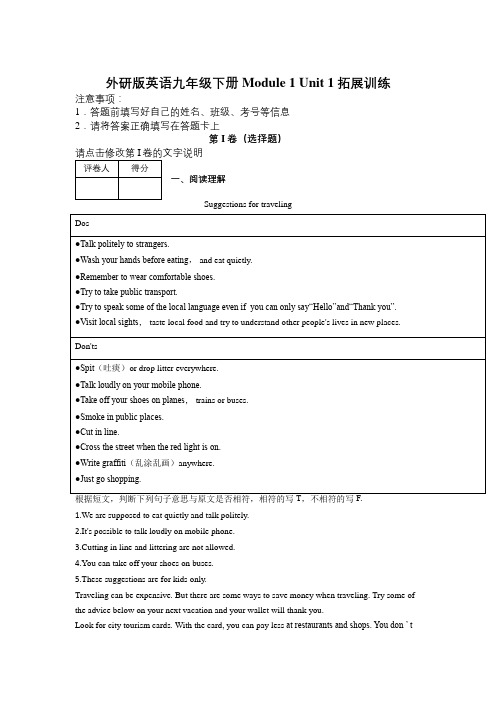
外研版英语九年级下册Module 1 Unit 1拓展训练注意事项:1.答题前填写好自己的姓名、班级、考号等信息2.请将答案正确填写在答题卡上第I卷(选择题)一、阅读理解Suggestions for traveling1.We are supposed to eat quietly and talk politely.2.It's possible to talk loudly on mobile phone.3.Cutting in line and littering are not allowed.4.You can take off your shoes on buses.5.These suggestions are for kids only.Traveling can be expensive. But there are some ways to save money when traveling. Try some of the advice below on your next vacation and your wallet will thank you.Look for city tourism cards. With the card, you can pay less at restaurants and shops. You don ’ thave to wait for a long time at busy attractions. You might even get free tickets to top tourist attractions. City tourism cards can save your money and time without question.Don’t get the best room. How long will yo u stay in your room? Will you just be sleeping there? Do you really need a bigger room with a good view(景色)?Find a hotel outside a city. It can help you save some money by choosing a hotel away from big tourist attractions, for you are always doing the same 一 go to the attractions and then return to your hotel to sleep.Book (预订)a room with a kitchen. Although some people might not like to cook while on vacation, I don’t mind making breakfast in my room. We always eat at a nice restaurant on our last night of the vacation. I’d rather eat breakfast and lunch at the hotel and then spend much money on a delicious supper.阅读上面的信息,选择正确答案6.With ,you can pay less at restaurants and shops.A. ID cardsB. tourism cardsC. bank cardsD. phone cards7..The underlined words “tourist attractions” n Paragraph 2 mean .A. 旅游方式B. 旅游设施C. 旅游手册D. 旅游景点8.To save some money, the writer advises tourists to .A. get the best roomB. live near big tourist attractionsC. live away from big tourist attractionsD. take a map with them when traveling9.The writer prefers to make breakfast and lunch in the hotel because .A. they are healthier and more deliciousB. he likes cookers in the hotelC. there are not any restaurants in the neighborhoodD. he ’ d rather, spend much money on a delicious supper10.What does the passage mainly talk about?A. How to save money when traveling.B. w to get a tourism card.C. How to find a hotel outside a city.D. w to book a room on the Internet.第II卷(非选择题)二、任务型阅读Some people have found that they always spend much more on travelling than planned.Here is how it happens:1.Preparing too much before travellingSome people,especially females,like to travel as if starting a new life.Several weeks beforethe trip,they would be busy shopping for new dresses,better sunglasses and best-sellingbooks.They would rather fill their travelling bags up with all fashionable things.Just travelling?Attending a fashion show is more like it.They care more about their appearance than the sights they see during the trip.2.Following other travellers blindlyThey can't stop shopping for objects they would never normally buy and would certainly never use.For example,we can find a group of travellers “getting ahead” to buy “Christmas” presents even in summer.3.Replacing things that are forgotten to bringThey don't remember to bring things like trainers,cool bags,toothbrushes or beach towels.The towels sold near beaches are nearly the price of gold leaves.They spend a lot on thosethings.However,plenty of new towels are sleeping in their bathroom at home.阅读以上信息,用恰当的单词完成下面的短文,每空一词。
- 1、下载文档前请自行甄别文档内容的完整性,平台不提供额外的编辑、内容补充、找答案等附加服务。
- 2、"仅部分预览"的文档,不可在线预览部分如存在完整性等问题,可反馈申请退款(可完整预览的文档不适用该条件!)。
- 3、如文档侵犯您的权益,请联系客服反馈,我们会尽快为您处理(人工客服工作时间:9:00-18:30)。
英语拓展提升训练王媛媛I. 单项选择(15分)1. This is ________ umbrella and it is ________ orange.A. a; anB. an; aC. an; /D. /; an2. It’s fine today. ________ taking photos in the park this afternoon?A. Why don’tB. How aboutC. Why notD. Shall we3. —Where is Tom?—He ________ England and will get back in two days.A. has been toB. has beenC. has gone toD. has gone4. There will be ________ in the north of China in the next twenty-four hours.A. rainB. snowyC. cloudD. wind5. ________ the help of my teacher, I have improved my English greatly.A. ByB. WithC. ThroughD. Under6. They hardly watch TV on school nights, ________?A. will theyB. aren’t the yC. do theyD. didn’t they7. — ________? —She is tall and thin.A. What does your sister doB. What does your sister look likeC. What does your sister likeD. What is your sister looking at8. It’s important for us ________ some trees every year.A. to plantB. plantingC. to cutD. cutting9. Tony’s song ________sweet. We all like it.A. soundsB. tastesC. looksD. feels10. Mr. Brown knows little Japanese, ________he can’t understand the i nstructions(说明)on the bottle of the pills(药片). A. and B. but C. or D. so11. Try to sing some English songs, and you’ll find it interesting ________a foreign language.A. learningB. learnsC. learnD. to learn12. —Mom, Bill is coming to dinner this evening.—OK. Let’s give him ________to eat.A. anything differentB. different anythingC. something differentD. different something13. I lost my mobile phone last night. ________ I finally found it under the bed.A. EspeciallyB. RecentlyC. ImmediatelyD. Luckily14. —Who is the man over there? Is it Mr. Li?—No, it ________be him. Mr. Li is much taller.A. mustn’tB. may notC. can’tD. needn’t15. —Betty, remember to close the window before leaving the room.—________.A. Yes, pleaseB. Don’t mention itC. It’s hard to sayD. OK, I willⅢ. 完形填空(10分)One of the most important ways to help plants and animals is to protect their habitats (栖息地). There they can live 1 too much interference (干涉) from humans. It is also important to 2 habitats outside reserves.You can visit a nearby national park or a(n) 3 reserve. Some national parks have 4 tour guides. Talk to the rangers (护林员) to find out if animals are in danger and 5 people protect them. For example, you and your friends 6 help the rangers with their work. If you have friends on farms, 7 them to keep patches (小块地) of bush as wildlife habitats and to leave old trees standing, especially those with hollows (洞) suitable for nesting animals. Some groups 8 local lands and nature reserves. They do this by removing weeds and planting local native species in their places. You could join one of these groups, or 9 start a new one with your parents and your friends. Remove rubbish and replant trees; all these will also encourage native animals to 10 .1. A. without B. with C. for D. in2. A. keep B. protect C. save D. leave3. A. ocean B. market C. nature D. country4. A. special B. boring C. traditional D. clean5. A. when B. how C. where D. what6. A. would B. must C. have to D. can7. A. make B. ask C. stop D. send8. A. look into B. throw out C. throw away D. look after9. A. even B. ever C. since D. already10. A. sleep B. die C. return D. moveⅣ. 阅读理解(30分)(A)Do you know the man with a pair of glasses in the picture? His name is RobertEdwards. He’s a famous British physiologist (生理学家). His IVF(试管婴儿)technology is one of the most important inventions (发明) in the 20th century. It’sa new way to help those couples who have no possibility of having a baby.Robert was born on September 27th, 1925. After finishing high school, he servedin the British Army. Later he studied at the University of Wales and the University ofEdinburgh(爱丁堡大学). He joined Cambridge University in 1963.People call him “the father of test-tube baby” because he created the first test-tube baby on July 25th, 1978. The birth of Louise Brown at 11: 47 pm on July 25th, 1978 made medical history.In 2010 Robert won the Nobel Prize for Physiology (诺贝尔生理学奖). So far there have been over four million babies born out of IVF technology.阅读短文,判断句子正误。
正确的填“T”,错误的填“F”。
( )1. Robert Edwards is a famous American physiologist.( )2. IVF technology can help those couples who have no possibility of having a baby.( )3. Robert was once a student at the University of Wales.( )4. Louise Brown was born on July 27th, 1978.( )5. In 2011 Robert won the Nobel Prize for Physiology.(B)In America, just as in Europe, men usually open doors for women, and women always walk ahead of men into a room or a restaurant, unless(除非)the men have to be ahead of the ladies to choose the table, to open the door of a car or do some other things like the above. In the street, men almost always walk or cross the street on the closer side of the ladies to the traffic. But if a man walks with two ladies, he should walk between them. Then if the host (男主人)or hostess (女主人)or both of them come in a car to get their guest for dinner, the guest should sit at the front seat and leave the back seat though there is no people sitting on it.6. In America, men usually ________ .A. walk ahead of womenB. eat in a restaurantC. walk behind womenD. drive a car to work7. In the street, men ________.A. cross the streetB. walk on the right side of the ladiesC. walk near the ladiesD. walk on the closer side of the ladies to the traffic8. If a man walks with two ladies, he should ________.A. walk between themB. run before themC. follow themD. go away9. If Mrs. Green invites you to her house in a car, you should________ .A. jump into a carB. sit at the front seatC. sit at the back seatD. drive a car10. Which of the following is TRUE?A. In America, men usually open doors for women.B. Women always walk ahead of men into a room or a restaurant in Japan.C. If you get into a host’s car, you can sit at the back.D. The passage tells us the custom of England.(C)Is a name important for a person? For many famous persons, theirnames may bring them a lot of money.Michael Jordan, the NBA famous basketball player, has given hisname to many popular products. And the company which uses his namegives much money to him.Maybe that’s why Jordan is suing(起诉)a Chinese company called“Qiaodan”. It makes shoes and clothes for playing sport s, and makes a lotof money. The problem is, Qiaodan is Jordan’s name in Chinese. Jordan owns a copyright on his name. This means others can’t use it to make money, unless he agrees. Qiaodan never asked him if they could use his name.But is “Qiaodan” the same name as “Michael Jordan”? Qiaodan says it isn’t. “We just use a Chinese translation of a common foreign family name, and it can’t be identified(被识别) with Michael Jordan. ”Jordan thinks it can be. After all, Qiaodan has a logo that looks like a logo of NIKE’s , and even sells shoes named after Jordan’s children.But Qiaodan has been using the name for about 12 years, and Jordan is suing this year. Why did he wait so long?Some say he is too late. Under Chinese law, Qiaodan already owns the copyright on “Qiaodan” in China. Michael Jordan may own the name “Michael Jordan”, but does he own “Qiaodan”? What do you think?11. Michael Jordan is a famous________.A. football playerB. basketball playerC. baseball playerD. volleyball player12. Jordan is suing a Chinese company called “Qiaodan” maybe because________.A. the Chinese company called “Qiaodan” makes shoes and clothes for playing sportsB. the Chinese company uses a Chinese translation of a common foreign family nameC. the Chinese company uses his Chinese name “Qiaodan” to make money without his permissionD. the Chinese company called “Qiaodan” has been using the name for about 12 years13. The Chinese company called “Qiaodan” thinks________.A. “Qiaodan” is the same name as “Michael Jordan”B. “Qiaodan” is only a Chinese translation of a common foreign family nameC. “Qiaodan”can be identified with Michael JordanD. the logo of “Qiaodan” is the same as the logo of NIKE’s14. Under Chinese law, Qiaodan already owns ________.A. th e copyright on “Qiaodan” in ChinaB. the copyright on “Michael Jordan” in ChinaC. the copyright on “Jordan’s children” in ChinaD. the copyright on “Qiaodan” in the USA15. The main idea of this passage is about________.A. the importance of a person’s n ameB. why Michael Jordan has given his name to many popular productsC. the reason why Michael Jordan is famous in ChinaD. whether Michael Jordan owns the copyright on “Qiaodan” or notⅤ. 任务性阅读(10分)When your feelings are bad, what can you do? Let me tell you a good way of solving this problem. If it is sunny outside, go out and stay in the sun for half an hour, and you will be better soon.Scientists believe that weather affects(影响) people’s feelings. When the sun is shining, people often feel (A) ________ , but when it is cloudy, people often feel bad.Also, you should pay more attention to your health in different weather.For example, in hot summer, you should have more sleep. You can get up late in the cool morning. When the temperature is over 32℃, you should stop having sports.根据所给材料,完成下列任务1. What’s the meaning of the underlined word “solving” in Chinese?A. 避免B. 预防C. 解决D. 改善2. 文中(A)处所缺的单词是:__________任务三:判断正误。
